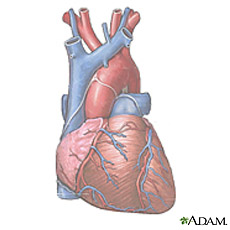National Institutes of Health
- The primary NIH organization for research on Cardiac Arrest is the National Heart, Lung, and Blood Institute
 A service of the U.S. National Library of Medicine
A service of the U.S. National Library of Medicine  National Institutes of Health
National Institutes of Health
The heart has an internal electrical system that controls the rhythm of the heartbeat. Problems can cause abnormal heart rhythms, called arrhythmias. There are many types of arrhythmia. During an arrhythmia, the heart can beat too fast, too slow, or it can stop beating. Sudden cardiac arrest occurs when the heart develops an arrhythmia that causes it to stop beating. This is different than a heart attack, where the heart usually continues to beat but blood flow to the heart is blocked.
There are many possible causes of cardiac arrest. They include coronary heart disease, heart attack, electrocution, drowning, or choking. There may not be a known cause to the cardiac arrest.
Without medical attention, the person will die within a few minutes. People are less likely to die if they have early cardiopulmonary resuscitation (CPR) and defibrillation. Defibrillation is delivering an electric shock to restore the heart rhythm to normal.
NIH: National Heart, Lung, and Blood Institute
References and abstracts from MEDLINE/PubMed (National Library of Medicine)
